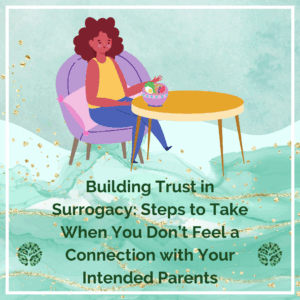
We often hear stories of surrogates and intended parents becoming lifelong friends — bonding over shared hopes, frequent check-ins, and the incredible experience of bringing a child into the world. But what if that doesn’t happen? What if the relationship feels distant, awkward, or simply doesn’t “click”? It’s something many surrogates quietly wonder, and the truth is: that’s okay. A surrogacy journey doesn’t have to be deeply emotional to be meaningful and successful.
Why the Connection Isn’t Always Instant (or Ever)
Every surrogacy match is unique. Some people connect instantly, while others take longer — or never quite move past the polite and professional stage. Personalities, communication styles, cultural or language differences, time zones, or even emotional overwhelm can all influence how a relationship unfolds. In some cases, intended parents may be hesitant to get too close out of fear or past loss. In others, a surrogate may prefer boundaries that keep things simple and clear.
It’s important to remember: emotional closeness isn’t a requirement for a successful journey. What truly matters is mutual respect, open communication, and a shared dedication to the process.
Managing Expectations
It’s natural to hope for a warm, friendly relationship — and for many, that’s exactly what happens. But for others, the connection remains surface-level. That doesn’t mean the match is “bad” or the journey is less valuable. Surrogacy is a deeply personal experience, but it’s also a collaborative arrangement between individuals who may approach it very differently.
Let go of the pressure for it to look a certain way. Not all connections are instant or intense, and that’s okay.
Tips for Building Healthy Communication
Even without a deep bond, you can still foster respectful and effective communication. Here are a few tips:
-
Be clear about your preferences early on (text updates, video calls, email summaries, etc.).
-
Let your agency help with the initial flow of communication, especially if things feel awkward or slow to start.
-
Focus on sharing key moments like medical updates, appointment summaries, and ultrasound photos — these are meaningful no matter the relationship dynamic.
-
Be open to connection, but don’t feel pressure to force it. Sometimes warmth grows with time; sometimes it doesn’t.
When to Speak Up
If something doesn’t feel right — if you ever feel dismissed, disrespected, or uneasy — it’s important to speak with your agency. They can step in to mediate, reset boundaries, or clarify expectations. In rare situations, rematching may be needed, but more often, small changes in communication help ease tension and move things forward smoothly.
Redefining What “Connection” Means
A connection doesn’t always look like frequent texts or heartfelt conversations. Sometimes, it’s quiet understanding. Sometimes, it’s simply showing up, doing your part with compassion and integrity, and helping create something life-changing. You may not become chosen family — and that’s okay.
Final Thoughts
Every surrogacy journey is different. Whether your relationship with the intended parents is warm and chatty or calm and businesslike, what matters most is mutual respect, trust, and a shared goal. You don’t need to feel close to make a lifelong impact. The act itself — helping build a family — is a connection that lasts forever.
